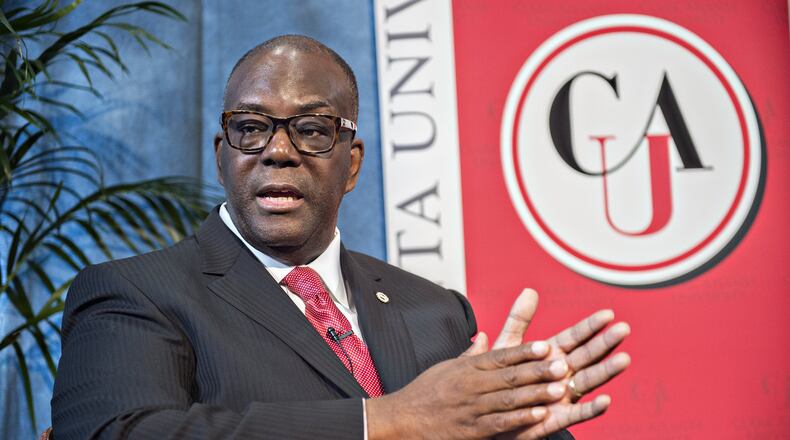It's been 15 months since Ronald Johnson began his tenure as president of Clark Atlanta University. When the former Texas Southern University business dean was announced as the new leader early last year, he came into the job with a plan of action for enrollment, curriculum and fundraising.
During his time at Clark Atlanta, Johnson has been vocal about local issues, such as crime and campus safety, as well as national subjects, like student loan debt and the future of historically black colleges and universities.
We talked with Johnson last month about his first year leading Clark Atlanta — his inauguration will finally take place today at 11 a.m. — and about the status of some of the goals he had hoped to achieve.
Q: What is the status of your fundraising and enrollment goals? Last October, your goal was to increase enrollment from about 3,650 students to between 3,800 and 4,000 students in the next five years.
A: Our fall 2015 enrollment was 3,661 students. The target for fall 2016 is 3,811 students. Freshman class enrollment is near an all-time high. (Since the interview, Clark Atlanta announced its enrollment had peaked at almost 4,000 students, with the most new undergraduate students enrolled since 2007.) That kind of enrollment growth means we'll really be looking at retention and at our graduate programs and how we can get those programs to be more challenging in terms of growth. One challenge facing the university is housing the number of students wanting to stay on campus. (Since the interview, Clark Atlanta announced its enrollment had peaked at almost 4,000 students, with the most new undergraduate students enrolled since 2007)
With the capital (fundraising) campaign, my wife and I visited 13 alumni chapters around the country to engage with graduates and generate support. The theme for the inauguration will be “Lifting Every Voice,” which will include a scholarship fund. We have to put our resources into helping students.
Q: Clark Atlanta is in its first year offering a competency-based styled education allowing students to earn stackable credentials as they learn new skills and complete programs. What is the status of that program?
A: This is the first year with a new core curriculum. Previously our curriculum consisted of 62 courses and now has been reduced to 32 credit hours, and all 51 (of the university's) programs fall into the new core curriculum. With the freed-up 30 credit hours, or as many as 10 courses, we are giving students the opportunity to add stackable credentials, things like project management and geographic information systems, which expands our students' educational bandwidth.
>>RELATED: Clark Atlanta University changing its academics for future
Stackable credentials are not totally new to a four-year-college setting, and have been used at the University of Texas at Austin. In two-year schools, the stackable credentials are vertical (example: auto mechanic level 1, auto mechanic level 2, auto mechanic 3). Here it’s not vertical, but where you jump across areas to those things that are compatible to you and your program.
(Clark Atlanta's retention rate for students who return after their first year is 61 percent, lower than the national average of 68 percent; CAU's graduation rate is 40 percent, just under the 42 percent national average, according to federal education data.)
Q: What are your other initiatives for this year?
A: Formulating a department that's focused on cyber physical systems. A group of faculty from the areas of computer science, data analytics, robotics, and others will generate a new class of stackable credentials in these areas. We are also focused on other work in our mass media program, and will have alumni helping with this as well.
The university has also launched a Career Pathways Initiative, which uses data to track and improve student performance. We are building the models now that will show where students tend to get stuck, and what needs to happen to get them unstuck.
About the Author
Keep Reading
The Latest
Featured

